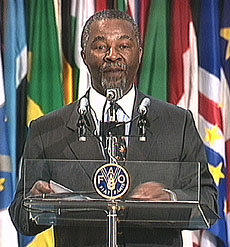


SOUTH AFRICA - AFRIQUE DU SUD - SUDAFRICA | ||
His Excellency Thabo Mvuyelwa Mbeki, Deputy President of the Republic of South Africa | ||

It is perhaps the height of folly that, at so august a gathering, we should pose a question about the purpose and meaning of human civilization. But to meet in a city so ancient and historic as Rome and to be confronted by the wealth of human creativity, represented by its inimitable works of art, leaves each one of us with no choice but to indulge in such reflection. We believe that we would not be wrong if we said these works of art and human civilization itself properly understood, constitute a celebration of life. And more they represent the continuous effort of all humanity to break loose from an existence characterized by an unrelenting enslavement by the forces of the natural world. That we had to convene here from all the ends of the earth, to participate in a World Food Summit, surely constitutes a severe rebuke for all of us, that through the ages, we could have given birth to a human civilization, one of whose legacies is dire poverty for hundreds of millions of fellow human beings. To speak of lack of access to food and the pestilence of hunger, is indeed to speak of poverty. It is to speak of a divided world, one part of which bears all the terrible features of human degradation and the denial of the human dignity of millions of both young and old, who have been condemned to demean themselves because they have to beg for alms, to forage in the rubbish dumps of our towns and cities for food, to prostitute themselves and to wander in the wilderness in search of anything that nature may chance to provide. Surely, none of this can be said to represent the purposes of human civilization, a condition of life for some, which anyone of us can find acceptable. Rather, the unequivocal determination must be made by all of us that this condition of life, which robs many of their human dignity and sentences them to certain and painful waste and death, is unacceptable. And having made that determination, we must, surely reaffirm that the purpose and meaning of human civilization, the central aim and justification of governance and social organization is the all-round and sustained upliftment and development of all human beings, from the very young to the very old. Our presence at this Summit, as governments, must therefore constitute a solemn undertaking in front of the whole world, a commitment to account to all humanity, that we will strive continuously to honour this objective of the all-round and sustained upliftment and development of all these citizens over whose lives we preside. Clearly, we know what needs to be done. If we did not, we would not have produced the directives to ourselves contained in the Rome Declaration on World Food Security and the World Food Summit Plan of Action. And further, we would not have done this work if it was not underwritten by a common pledge, no longer merely to talk, but to act. Correctly, all of us are engaged in a struggle to define what has been described as the new world order. Whatever the outcome of that struggle, what is obvious, is that this new world order will, in part, be characterized by the ever-growing and escalating interdependence of the nations of the world. Increasingly, we cannot escape the reality that the prosperity of one part of humanity will depend on the prosperity of the other. It will be a new world which will not be able to tolerate the existence of islands of wealth which benefit the few, surrounded by a universe dominated by poverty for the majority. In as much as, even the most powerful and prosperous among us, could not insulate themselves from the tragedy of a million starving refugees in Eastern Zaire, so can we not continue to pretend that the blight of poverty, which afflicts a major part of my own continent and country, are mere ills of an alien world. Much as we might seek to seal ourselves within the air-conditioned, tall and elegant buildings of our modern cities, the frustrated and angry voice of the poor and hungry will break through, even if the law describes them as illegal migrants. The conclusion is inescapable that to address the challenge of world food security successfully, requires that we address also the decisive question of a better and more equitable distribution of productive resources, especially from the North to the South, encompassing, among others, knowledge, capital and technology. This, perhaps, will be the defining challenge of the new century that is already upon us. Those of us who live in the midst of a visible and enveloping misery of poverty have no choice but to hope that the minority of humanity which happens to control the bulk of the productive resources of the world, will themselves and in their own interest, affirm their commitment in word and deed, to the cause of the upliftment of a humanity that is not defined by nationality, by colour, by race or by gender. The hungry, wherever they may be, have a right to be fed. We salute FAO and its Director-General for making it possible for all of us to speak in one voice and say, again - the hungry have a right to be fed! | ||
|
|
|
|

 |